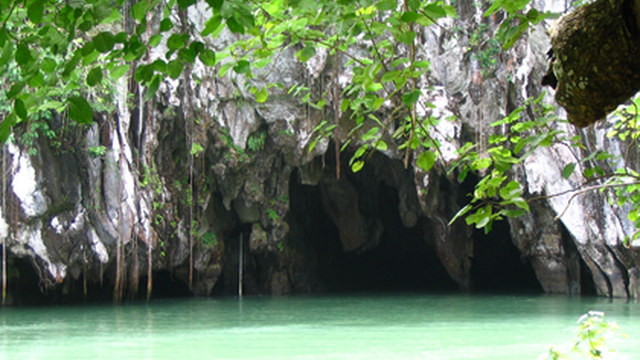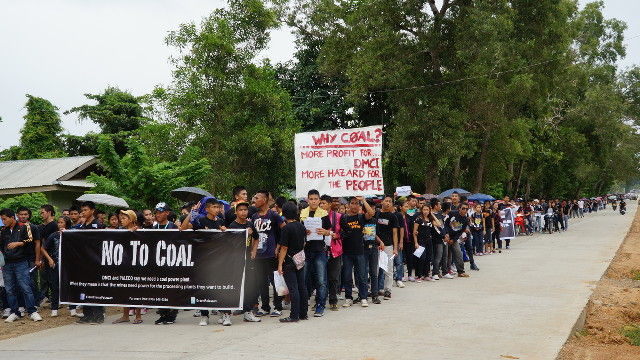SUMMARY
This is AI generated summarization, which may have errors. For context, always refer to the full article.
MANILA, Philippines – Palawan may lose its status as a UNESCO Man and Biosphere Reserve if plans to put up a coal power plant in the province pushes through.
The site for the coal plant eyed by DMCI Power Corporation, a subsidiary of real estate company DMCI Holdings, is near a fish sanctuary, according to Christopher Ng, Climate Change and Energy Communications Officer of Worldwide Fund for Nature (WWF) Philippines.
On Monday, September 30, around 1,500 students and locals of Aborlan, a municipality in Palawan, marched in protest against the proposed coal plant.
“We oppose the coal plant because of the negative impacts on health and the environment, particularly to locally declared fish sanctuaries in the area,” said Lita Sopsop, Dean of the College of Arts and Sciences of the Western Philippines University, a school in Aborlan.
“Fishing is the livelihood of people there. The discharge of waste water from the coal plant will cause thermal pollution that is hazardous to the marine ecosystem, especially coral reefs.”
‘Last frontier’
Palawan is touted by environmentalists as the “last frontier of the environment in the Philippines.” Its special ecological status is affirmed by the government’s creation of an environmental agency dedicated to protecting its natural resources, the Palawan Council for Sustainable Development (PCSD).
UNESCO declared Palawan as a Man and Biosphere Reserve in 1990, classifying the province as a “site of excellence where new and optimal practices to manage nature and human activities are tested and demonstrated.”
But the international body is currently reassessing Palawan’s special status. The plan to put up a coal plant may threaten the title. Coal is a non-renewable source of energy and a type of fossil fuel. The combustion of fossil fuel is a major emitter of greenhouse gases like carbon dioxide responsible for global warming and climate change.
READ: Warmer Earth, humans to blame – UN Panel
Two UNESCO World Heritage Sites are located in Palawan, namely the Tubbataha Reefs Natural Marine Park and the Puerto Princesa Underground River.

No permit
According to a PCSD statement, DMCI Power Corporation won the bid for New Power Provider for the Palawan Electric Cooperative (PALECO) and signed a Power Supply Agreement in July 2012. However, they have to secure a Strategic Environmental Planning (SEP) clearance from the PCSD before construction of the coal plant can begin.
DMCI first planned to build the coal plant in the municipality of Narra, but strong opposition from environmentalists and locals persuaded the PCSD not to issue a SEP clearance. Narra Mayor Lucy Demaala also refused to issue a permit for the project.
Opponents of the plant – including Katala (Philippine Cockatoo) Foundation, Inc and Palawan Alliance for Clean Energy (PACE) – said the facility would endanger the environment and put the livelihood of fishermen at risk.
The plant was originally to be built near a marine protected area where populations of critically-endangered Philippine cockatoo forage.
“Because of the serious impacts of the project and the opposition it generated, the proponent will have to start from scratch,” read the PCSD decision to not issue a SEP clearance.
“They will need to look for another location where their power plant will be environmentally and socially acceptable.”
The council clarified that its position does not necessarily promote coal as a source of energy but expresses its hope “for DMCI to shift to renewable sources in the near future.”
Higher electricity cost
Groups in Palawan also question the price of electricity generated by the coal plant, saying it will be higher than cleaner, indigenous and renewable energy sources.
The coal plant will sell electricity at P9.38 per kilowatt hour (kwh). Including VAT (value-added tax), the price goes up to P10.51 per kwh. But a proposed hydropower project will sell electricity at P6.59 per kwh, said WWF-Philippines.
“Why should Palawan buy more expensive, dirty power when we have cleaner, cheaper alternatives available?” asked Gerthie Mayo-Anda, convener of the Palawan Alliance for Clean Energy (PACE).
READ: Green groups urge more domestic action on climate change
“It is not just Palawan that will pay for this expensive electricity but the whole country as well due to the subsidy that NPC-SPUG (National Power Corporation – Small Power Utilities Group) areas receive from the national government.
“Palawan could be helping the country save money rather than wasting it.”
Current pending hydropower projects in the region could save the Philippines an estimated P750 million a year from fossil fuel costs and mitigate about 26,000 tons of carbon dioxide emissions, according to WWF-Philippines statement. – Rappler.com
Add a comment
How does this make you feel?

There are no comments yet. Add your comment to start the conversation.